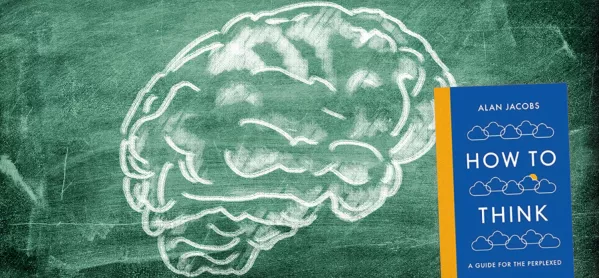- Home
- Book review: How to Think by Alan Jacobs
Book review: How to Think by Alan Jacobs

How to Think: A Guide for the Perplexed
Alan Jacobs
Profile Books
160pp, £10.99 (hardback)
9781781259566
I have recently moved on from the school that I helped to set up. It had been a huge part of my life for eight years - it was basically my fifth child - but it felt like the perfect time for the organisation, as well as an opportunity for me to shake stuff up on a personal level and do different things after 15 amazing years of working in schools.
One of the changes I wanted to make was to carve out more time to read and think - really think - about issues. So Alan Jacobs’ How to Think: A Guide for the Perplexed could not have arrived at a better time. And it’s great, especially if you’re trying to break away from the instantaneous habits of social media to re-engage the brain to consider the principles, discipline and practice of deep, rigorous thinking.
Drawing upon a wide range of insightful, classic or just plain funny sources, Jacobs has written a guide to take the reader, step by step, through what he considers to be a journey towards… Actually, that’s part of what made the book feel different once I’d finished it and had time to reflect: it’s not a guide towards a specific destination, but a certain state of permanent-but-ever-changing mind.
Jacobs is very clear from the start what he aims to do - get us to recognise the forces that influence our thinking and consider their implications - and how he will do it. “We will always circle back to the forms that bad thinking takes, and discover habits that can help us better practise this most delicate of arts,” he writes.
As I worked my way through the book, I found myself constantly nodding along or sighing in vehement disagreement with the point he was making or trying to disprove. The fact that his references are as varied as Brian Eno, John Stuart Mill, Martin Luther, Westboro Baptist Church and Malcolm Gladwell meant that I was kept on my toes, never quite knowing what was going to come next. So this short book with challenges in every paragraph never felt quite as much hard work as it could have done.
And while he is adamant that the book is not just a response to the recent effect of social media on the ways we think about and engage with one another, again and again I found myself reflecting on the ideas covered and how they related to the world of educational blogs and Twitter. I love the way those of us in education can now engage with people and ideas from afar. It’s certainly changed my views on important issues, and made my school better for our kids as a result.
Wanting the best for kids
That said, the growing intensity and aggression in the debate between various education “tribes”, and accompanying witch-hunts and trolling, have now reached such a level that I fear these wonderful means of ideas exchange could self-destruct or put newcomers off. After all, we’re all in the same profession wanting the best for kids - can’t we all agree to disagree and just get along?
But, as Jacobs points out, this kind of vitriolic attack on people in the same sector is nothing new. Even pious theologians haven’t been able to resist: “Thomas More’s attacks on Martin Luther and his followers… make most of today’s online insult fests seem tame.” (Look them up, as they’re a bit rude for these pages, but they’re brilliantly disgusting.) However, I’m not sure that religious wars, of the metaphorical or literal variety, are where we want to get to in education with our relatively new professional freedoms and means of communicating with one another.
Fortunately, if Jacobs is right, we can recognise the external influences on our thinking and do something to harness their positives and limit the negatives. (The way he goes about this put me in mind of, but is very different from, what Malcolm Gladwell did in Blink.) At the very least, I’m going to adopt the “Thinking person’s checklist” hidden away at the back of the book. I am also rethinking how I approach Twitter - and I think anyone in education who reads this book would probably do the same.
Jacobs doesn’t claim changing our habits of thought is easy, just that it is possible with “courage and determination to do the hard work of thinking”. I hope he is right when he says that “we have good cause for hope”.
Mark Lehain is director of Parents and Teachers for Excellence and founder of Bedford Free School
Keep reading for just £1 per month
You've reached your limit of free articles this month. Subscribe for £1 per month for three months and get:
- Unlimited access to all Tes magazine content
- Exclusive subscriber-only stories
- Award-winning email newsletters


